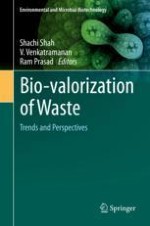2021 | OriginalPaper | Buchkapitel
14. Biorefinery: Potential and Prospects for Utilisation of Biogenic Waste
verfasst von : Shachi Shah, V. Venkatramanan, Ram Prasad
Erschienen in: Bio-valorization of Waste
Verlag: Springer Singapore
Aktivieren Sie unsere intelligente Suche, um passende Fachinhalte oder Patente zu finden.
Wählen Sie Textabschnitte aus um mit Künstlicher Intelligenz passenden Patente zu finden. powered by
Markieren Sie Textabschnitte, um KI-gestützt weitere passende Inhalte zu finden. powered by
